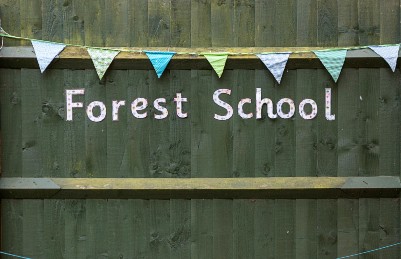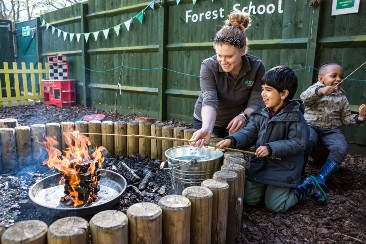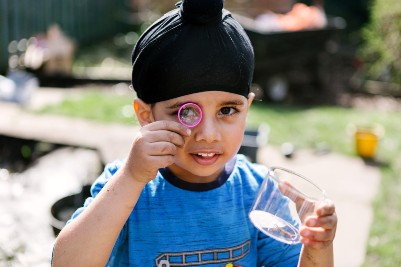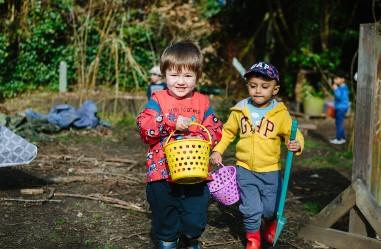By Susie Pitt

The Forest Schools initiative has gained nationwide recognition as a highly effective way of introducing children to the great outdoors, while at the same time enabling them to develop a wide range of transferable skills. Whatever the weather, our children will be found making dens and shelters, lighting campfires, learning about the natural environment and how to cherish it, practising basic survival skills and bush craft and benefiting from lots of fresh air.
We believe that the Forest Schools programme provides an excellent vehicle for learning and development. Children have a great affinity with the natural world. It arouses their curiosity and inspires wonder. It is a superb environment in which to assimilate knowledge and develop all manner of skills such as teamwork, good communication, problem solving, self-confidence, risk awareness and a positive mental attitude.

What is Forest School?
Quality Forest School is delivery which holds to all six key principles that shape and govern the Forest School ethos. There are many forms of outdoor education and all have enormous value, however, Forest School is unique in its reach, delivery and effect. These six principles are:
- Forest School is a long-term process of regular sessions, rather than one-off or infrequent visits; the cycle of planning, observation, adaptation and review links each session.
- Forest School takes place in a woodland or natural environment to support the development of a lifelong relationship between the learner and the natural world.
- Forest School uses a range of learner-centred processes to create a community for being, development and learning.
- Forest School aims to promote the holistic development of all involved, fostering resilient, confident, independent and creative learners.
- Forest School offers learners the opportunity to take supported risks appropriate to the environment and to themselves.
- Forest School is run by qualified Forest School practitioners, who continuously maintain and develop their professional practice.
Example of subject links:
Science: Outdoor messy experiments, forces, tree identification, parts and function of the plant, materials, scavenger hunts, dead or alive, and habitats.

Geography: Maps and orientation, exploring our environment, e.g: what’s underground?
History: Cavemen; what did they eat? How did they communicate? Make caveman bread, caveman art.
RE: Learn about historic religions and ceremonies; reenact!
Maths: Finding all the possibilities, problem solving, shapes, towers, measuring, estimating and probability.
Art: Messy art activities, land art, creating Andy Goldsworthy creations, sculpture in clay, watercolours and caveman art.
English: Adjectives for poems, instruction writing for making things in Forest School, story starters i.e. who left the massive dinosaur footprint? What’s the rusty old key going to open?
Mental Health and PSHE: Problem solving together and developing communication with each other, looking after themselves and others.
Cooking: What would they like to cook on the fire; pizzas, toast, chocolate oranges, damper bread? Can they make a giant cookie? Can they make their own recipe?
So, what’s the difference between Forest School and Outdoor Learning?
Forest Schools

- Qualified Leaders provide deep learning to engage the whole child
- Long term over the course of a year to develop new hard wired neuron connections to build resilience and a deep sense of self, including self confidence and self worth
- Each session is consecutive and based on the observations and a child’s innate desires for learning
- Recognises the uniqueness and brilliance of the individual child and follows their intrinsic motivations by tapping into their own resourcefulness and creativity as catalysts for learning
- Woodlands provide a singularly unmatched environment to evoke imagination, cultural inheritance and a plethora of loose parts to inspire the child to free play and maximise learning potential
- Develops emotional wealth of a child and others over time; Consciousness, Control, Catalyst, Compassion, Companionship and Community
Outdoor Learning
- Can be run by anyone and has a specific outcome for each session usually designed by the teacher or other adult
- Can be done in one lesson and has a finite beginning, middle and end
- One off session plan and is not dependent on what has gone before or will happen next
- Tends to be whole class focused in that there is a desired learning outcome for everyone as opposed to each child
- The resources are provided and are not solely dependent on the environment
- Time is usually restrictive and the freedom of the child to become divergent therefore is also restricted and if they do try and explore their own interests at that time they can be seen as disobedient or badly behaved .
- Concentrates on the cognitive aspects of learning as a one off; knowledge, understand and skills about an external concept
In summary…
Forest Schools and Outdoor Learning both come from the same root, that of a desire to engage children in the natural environment whilst learning specified outcomes. The difference and the uniqueness that sets Forest Schools apart from Outdoor learning is the it is focused on the whole child and their development over a long term progression of body, heart and brain in all that makes us human – as opposed to learning a specific adult initiated outcome, as a one off, outdoors.
Credit: Forest Schools Education – 2017
